
4 minute read
Expanding the scope: AI & the law
In the last edition of The Engineer, we sat down with two local AI experts, Alex Pottier, EIT, and Dr. Uday Venkatadri, P.Eng., who answered a question that’s been at the top of many engineers’ minds—will Artificial Intelligence take over my job? The simple answer is no; AI is a beneficial tool that can help complete tasks in a more efficient manner.
Today, Melanie McGrath, General Counsel and Corporate Secretary for CBCL, an employee-owned, multidisciplinary, environmental engineering consulting company, adds to this discussion by providing an interesting legal angle.
As General Counsel at CBCL, McGrath oversees contract review, their insurance program, risk management program and compliance filings. As Corporate Secretary, McGrath touches their holding company, CBCG, as well as their sibling company, the Atlantic Integrated Water Utility Consultants. She also supports the Human Resources and Marketing departments, sits on the Cyber Committee, and is actively involved in CBCL’s various EDIA initiatives. McGrath is an active volunteer for Engineers Nova Scotia on the Professional Practice Committee.
“Chat bots” have been a function on websites for decades, but the simulated text conversation has been obviously computer automated.
With the introduction of artificial intelligence technologies like ChatGPT, however, there arises a new dichotomy; that it isn’t always easily detectible when a response is bot-generated.
Although somewhat eerie and surrealist, AI tools are becoming increasingly commonplace in professional settings.
“The technology is a tool like any other,” says McGrath. “ChatGPT is a ‘garbage in, garbage out’ system, meaning any result you’re getting is going to be impacted by the question and inputs you provide. We need to understand its value, as well as its limitations, to incorporate it into our work lives.”
There are inherent risks and even potential consequences in applying AI to complete assigned tasks. First off, ChatGPT has no morality, nor does it understand the difference between information and disinformation. The tool gathers the data available on the Internet, and, as we all know, not everything online is reliable.
An engineer, like any other professional, should consider this reality before using ChatGPT to check off items on their to-do lists, and more importantly, use it to communicate with others.
“You need to review the sources that have been cited, and you must ensure that you agree with the conclusions that are being drawn with your own professional judgement,” says McGrath. “After all, the user is the one responsible for faulty data if reproduced for a project or client.”
Alongside being responsible for the validity of information, the other major legal implication of ChatGPT is data ownership.
When a user enters content into its model, it becomes part of the system’s database and, in turn, is used to craft responses to other users’ prompts. McGrath cautions engineers on adding any confidential information that may be in a contract, which, more often than not, includes a nondisclosure agreement.
“I think from a regulatory perspective, engineers are expected to exercise professional judgement and are responsible for their work. If they are not performing in a manner that is consistent with the standards expected of a professional engineer, then that could get them into some trouble,” McGrath says.
Although the legal system has always dealt with adjusting the law in accordance with new technologies, the case of AI is far more challenging. AI’s capabilities are growing to an extent that’s so widespread and rapid, it’s difficult for even machine learning experts to keep up with.
This being said, McGrath is confident that regulatory, corporate and legal structures will gradually adapt.
From an individual and user perspective, adaptation is also essential.
“Engineers need to keep up,” she says. “The standard that is going to be expected of engineers is that they use the available tools to provide a product or opinion. I would encourage engineers to remember the value they bring, even when using these tools that enable them to be more efficient and timelier—professional input will always reign valuable.”



